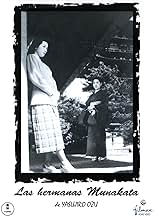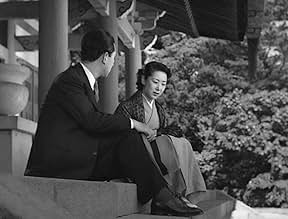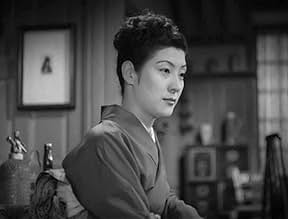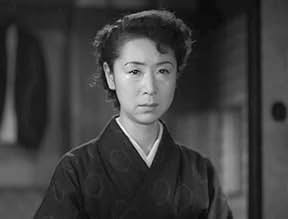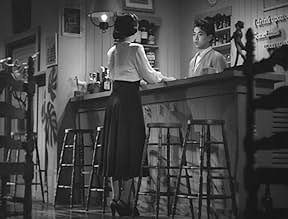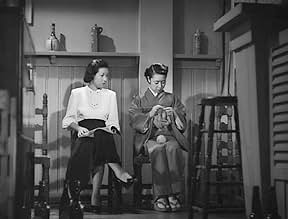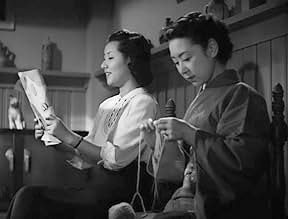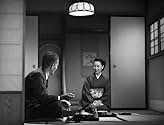Aggiungi una trama nella tua linguaSetsuko is unhappily married to Mimura, an engineer with no job and a drinking habit. She's always been in love with Hiroshi, but he left for France years ago without proposing. Now he is ba... Leggi tuttoSetsuko is unhappily married to Mimura, an engineer with no job and a drinking habit. She's always been in love with Hiroshi, but he left for France years ago without proposing. Now he is back and Mariko (Setsuko's sister) tries to reunite them, although secretly she loves him to... Leggi tuttoSetsuko is unhappily married to Mimura, an engineer with no job and a drinking habit. She's always been in love with Hiroshi, but he left for France years ago without proposing. Now he is back and Mariko (Setsuko's sister) tries to reunite them, although secretly she loves him too.
- Regia
- Sceneggiatura
- Star
- Premi
- 2 vittorie totali
Recensioni in evidenza
I just love Hideko Takemine in this film. She plays Mariko, the plucky younger Munekata sister who likes baseball more than temples, sticks her tongue out when she hears something she doesn't like, smokes from time to time, and speaks her mind freely about things she's frustrated with. She represents shifting cultural values and a more outspoken generation of younger women, which was really nice to see, particularly as it gave such life to this film.
Her older sister is Setsuko (Kinuyo Tanaka), who is devoted to her husband (So Yamamura) despite the fact that he's a lazy, unemployed drunk. She runs a bar, but is struggling to stay afloat financially, and moreover, has discovered that her father (Chishu Ryu) has less than a year to live. She was actually romantically interested in another man 15 years previously, Hiroshi (Ken Uehara), but only realized the depth of feelings when she got engaged, and he'd already gone away to France.
Well, Hiroshi is now back, which sets in motion a melodrama, as Mariko begins developing feelings for him, Setsuko's husband begins suspecting that his wife may be having an affair with him, and there is a third woman in the picture as well, a friend he made while in France (Sanae Takasugi). Having read her sister's old diary, Mariko would actually love for Setsuko and Hiroshi to be together, but can't help herself from playfully flirting with him too (and at one point, outright proposing to him, I mean, how the hell did he resist that?). Meanwhile, the husband is quite a tool, coolly (and unfairly) judging his wife while stroking a cat, and slapping her hard across the face seven times in case we couldn't hate him more.
It's often difficult to arrive at a satisfactory ending in such film, as emotionally we know what we want, but that path could be viewed as formulaic and not very artistic. I have to say, the route Ozu chose here wasn't very satisfying to me either, and I was almost tempted to reduce my review score, but had enjoyed it up until that point.
Some of the better scenes are when the sisters debate one another, even if it is expository, such as when Mariko questions her sister's marriage and Setsuko replies, "You're too young ... to understand marriage. It's not always a good time. Holding back is what keeps us going. That's how it is," to which Mariko says bluntly, "Then marriage is stupid." After Mariko has referred to her as outdated, Setsuko chastises her: "What doesn't become outdated is up-to-date. Things that are truly up-to-date are those that never get old. ... Your idea of up-to-date is skirt lengths going from long to short. If everyone has red nails, yours absolutely must be red too, no?"
With the ensuing tolerant fatherly advice for both young women to be themselves and how Setsuko's husband ultimately treats her, it seems there is a progressive message here, which I really enjoyed seeing from Ozu. Through signs we often see in English, including one for Coca Cola, he's reminding us of a changing world in Japan, but seeming to say that somehow it's going to be alright. Meanwhile in transitions between scenes, he gives us beautifully composed images, like clouds floating over hills or trains trundling by, the world impassive to the drama of these little lives.
It's Takemine's film, however. Her character is full of vitality, at times pretending to be a pompous narrator of romantic scenes, acting as a ballerina she's just seen, giving birdcalls to a nightingale with her father, or dancing around the room after tricking the other woman into thinking Hiroshi's left. She's played beautifully played by Takemine, who I'd watch in just about anything.
The titular sisters are Setsuko (Kinuyo Tanaka), the elder, and Mariko (Hideko Takamine), the younger. Setsuko is married to Mimura (So Yamamura) who is unemployed and has been for a while at the same time that the bar that Setsuko owns is seeing an extended down period. The film actually begins with Setsuko rushing out of Tokyo to meet with her uncle, an oncologist, who has diagnosed the girls' father (Chishu Ryu) with cancer, not telling him about the diagnosis which was the practice in Japanese medicine at the time (think Ikiru).
Knowing Ozu's films, it's obvious where this film is going to go: the sisters dealing with the impending death of their father. And yet, that's not what happens. Instead, the focus turns to an old love of Setsuko's, Hiroshi (Ken Uehara), who has recently returned to France, divorced, and present as a contrast to Mimura's downtrodden status. It becomes a story about two sisters fighting over views of the world, centered around the question of what to do about Hiroshi and Mimura.
And what makes Ozu's take on this melodramatic material about a failing marriage and a potential affair, with the added spice of the younger sister getting mad at the older sister and trying to marry the old lover, is the specificity of character. Setsuko opens the film with her interactions with her oncologist uncle, worrying about the state of her father. Their father helps provide thematic context for what happens. Mariko is frustrated at Setsuko's situation and wants her to break free from Mimura to make herself happy, presenting this contrast between old ways and new ways that the girls have to navigate through.
It all provides this great grounding for the large swings in emotion that end up dominating the final act. No one is milking the giant cow in terms of overacting, but there's much more shouting and obvious tension at play here than Ozu has shown in a long time. I suspect no small part of this change in direction is the sudden move to Shintoho, the offshoot of Toho Studios in the late 40s that was designed to compete directly with Toho, though Ozu had been working for Shochiku since the silent era (he'd return to Shochiku with his next film). Another issue is that this is one of a very few number of films Ozu made based on someone else's work (the novel by Jiro Osaragi of the same name). He obviously felt some kind of desire to preserve as much of the original novel as possible, refusing to make it completely his own like someone like Kubrick might have done.
So, when we get to the ending that includes an unexpected death that allows for a reunion, it's so heavily melodramatic that it kind of feels...out of place. Ozu's approach to filmmaking makes it feel out of place in the film itself, and Ozu's body of work makes it feel out of place there. That's not to say it doesn't work. It works fine, but it does not have the subtle power of the smaller movements of Ozu's work in general.
Essentially, The Munekata Sisters works fine as a small melodrama, but it feels like some kind of compromised work. Ozu, working for a new studio trying to gets itself off the ground, adapting a book that doesn't quite match his sensibilities, does the best he can and comes out with a respectable result. It's never going to be rediscovered as one of his great films, but it's a fine little entertainment in its own right.
As expected it was shot in contemplative manner, also highly romanticized mixing religious temple, confidential diary, father's illness, financial troubles, alcoholism and suppressed feelings as well, worthwhile to point out the magnificent performance of the sassy Hideko Takamine, furthermore Ozu displays the Setsuko's bitterness when your drunkard husband implies her a unfaithful wife, exposing a bad choice on marriage, nonetheless the sudden accident will change their fate, it's usually told in slow pace by the master-poet Yasujirô Ozu!!
Thanks for reading.
Resume:
First watch: 2025 / How many: 1 / Source: DVD / Rating: 8.25.
The film revolves around the relationship between older sister Setsuko (Kinuyo Tanaka) and her younger sibling Mariko (Hideko Takamine). Setsuko is more reserved and adheres to traditional Japanese values, while Mariko embraces modern trends and enjoys sassing people. Naturally, their personality differences bring them into conflict.
Takamine gives a fantastic and genuinely funny performance as Mariko, which is light-years different from the reserved heroines played by Setsuko Hara in Ozu's more acclaimed films. She does funny voices, sticks out her tongue, and even dismissively flicks a suit of samurai armor. (I assume that's a big no-no in polite society.) Yet underneath all this joking is a sensitive character who loves her older sibling, despite their obvious personality clashes.
By contrast, it's initially easy to overlook Tanaka as Setsuko. But as the film goes on, Setsuko's struggle with a loveless marriage starts to dominate the plot, and her character becomes compelling.
Speaking of the plot, it contains more romantic melodrama and unexpected twists than usual for Ozu - possibly because it's based on a serialized story, rather than an original creation. But Ozu directs it with his usual sensitivity and prevents the material from becoming corny or saccharine. Ozu also makes effective use of his graceful transitional or "pillow" shots in this film, which are even more beautifully composed than usual.
Some viewers (understandably) dislike the film's unusual ending. I won't spoil it here, but suffice to say that I actually liked it, and indeed thought it was the most honest way to resolve the story. Ultimately, this film is about two sisters who are very different people but very committed to each other, and the ending does justice to their relationship and its place in the story.
I was a fan of Ozu for 20 years before I bothered to check this out - because, who ever talks about The Munekata Sisters? (Its lack of U. S. availability didn't help, but it's on the Criterion Channel now.) Imagine my surprise when I discovered that this is a witty, wise movie that rounds out Ozu's filmography quite nicely. It's not an all-time great like Late Spring, sure, but a movie doesn't need to be a legendary classic to be awesome.
Lo sapevi?
- QuizThis was the first film made by star actress Kinuyo Tanaka after her triumphant months-long visit to the United States. Allegedly, Tanaka, from her recent contacts with Hollywood actors, was full of new ideas about acting, which she was not shy about sharing with her director, Ozu. The latter, who held his own very strong (and very un-Hollywood) ideas about acting, was reportedly not pleased by this, and relations between the two during filming were thus somewhat tense.
- ConnessioniFeatured in Il riccio (2009)
I più visti
- How long is The Munekata Sisters?Powered by Alexa
Dettagli
Botteghino
- Lordo in tutto il mondo
- 332 USD
- Tempo di esecuzione1 ora 52 minuti
- Colore
- Mix di suoni
- Proporzioni
- 1.37 : 1
Contribuisci a questa pagina


